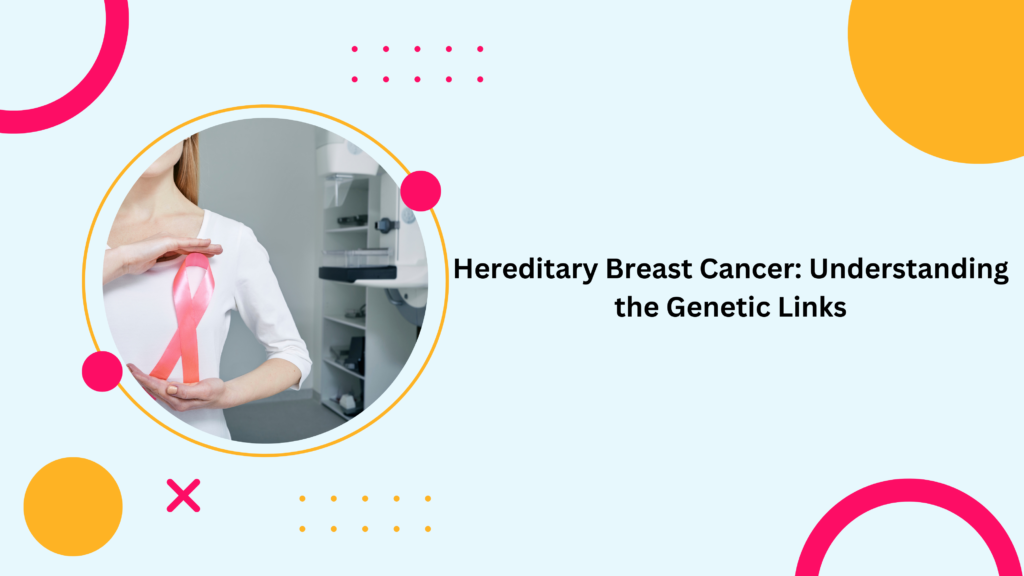
Introduction
Breast cancer is a pervasive health concern that affects millions of individuals worldwide. While
many cases of breast cancer occur sporadically, some individuals are at a higher risk due to
hereditary factors. This article explores the concept of hereditary breast cancer, the genetic
mutations associated with it, and the importance of early detection and prevention.
What is Hereditary Breast Cancer?
Hereditary breast cancer refers to breast cancer cases that are caused by inherited genetic
mutations. These mutations increase the risk of developing breast cancer and are often passed down
through generations. Understanding the genetic basis of hereditary breast cancer is crucial for
individuals with a family history of the disease.
Genetic Mutations and Risk
BRCA1 and BRCA2 Genes
The most well-known genetic mutations associated with hereditary breast cancer are the BRCA1 and
BRCA2 genes. Mutations in these genes significantly increase the risk of both breast and ovarian
cancer. Individuals with BRCA1 or BRCA2 mutations have a 50-85% lifetime risk of developing breast
cancer.
Other Genetic Mutations
Apart from BRCA1 and BRCA2, there are other genetic mutations, such as TP53 and CHEK2, that can
also elevate the risk of hereditary breast cancer. While these mutations are less common than BRCA1
and BRCA2, they are equally important to identify.
Identifying Hereditary Risk
If you have a family history of breast cancer, it’s essential to assess your hereditary risk. Genetic
counseling and testing can help determine if you carry any of the known mutations associated with
hereditary breast cancer. Identifying hereditary risk enables you to make informed decisions about
screening and prevention.
Screening and Prevention
Early detection is key in managing hereditary breast cancer. Regular breast cancer screening,
including mammograms and MRIs, may start at an earlier age for individuals with a higher risk due to
genetic mutations. Preventive measures, such as risk-reducing surgeries or medications, may also be
recommended.
The Emotional Impact
A hereditary breast cancer diagnosis can be emotionally challenging, not only for the individual but
also for their family members. Dealing with the knowledge of carrying a genetic mutation can evoke
fear and anxiety. Seeking emotional support and counseling is crucial in coping with these feelings.
Support and Resources
Numerous support organizations and resources are available to individuals with hereditary breast
cancer and their families. These organizations offer educational materials, support groups, and
guidance on managing the unique challenges associated with hereditary risk.
Advances in Genetic Testing
Advancements in genetic testing have made it more accessible and affordable for individuals to
assess their hereditary breast cancer risk. These advances allow for more comprehensive testing,
including multi-gene panel testing, which can identify a broader range of genetic mutations.
Conclusion
Hereditary breast cancer is a complex issue that requires careful consideration and proactive
measures. Understanding your genetic risk, undergoing appropriate screening, and seeking
emotional support are essential components of managing hereditary risk. While a hereditary
predisposition to breast cancer may seem daunting, it’s important to remember that early detection
and prevention can significantly improve outcomes.
FAQs on Hereditary Breast Cancer
- What is the difference between hereditary breast cancer and sporadic breast cancer?
Hereditary breast cancer is caused by inherited genetic mutations, whereas sporadic breast cancer
occurs without a known genetic predisposition. - Can men inherit hereditary breast cancer risk?
Yes, both men and women can inherit genetic mutations that increase the risk of hereditary breast
cancer. - How can I find out if I have a genetic mutation associated with hereditary breast cancer?
Genetic counseling and testing can help determine if you carry such mutations. Consult with a
healthcare provider or genetic counselor for guidance. - What are the options for breast cancer prevention in individuals with hereditary risk?
Prevention options may include risk-reducing surgeries, medications, and increased surveillance
through regular screening. - Are there any promising treatments for hereditary breast cancer on the horizon?
Research into targeted therapies and immunotherapies for hereditary breast cancer is ongoing,
offering hope for improved treatment options in the future.
In conclusion, hereditary breast cancer is a complex issue, but with awareness, genetic testing, and
early intervention, individuals at risk can take proactive steps to manage their health and reduce
their risk of developing this disease.